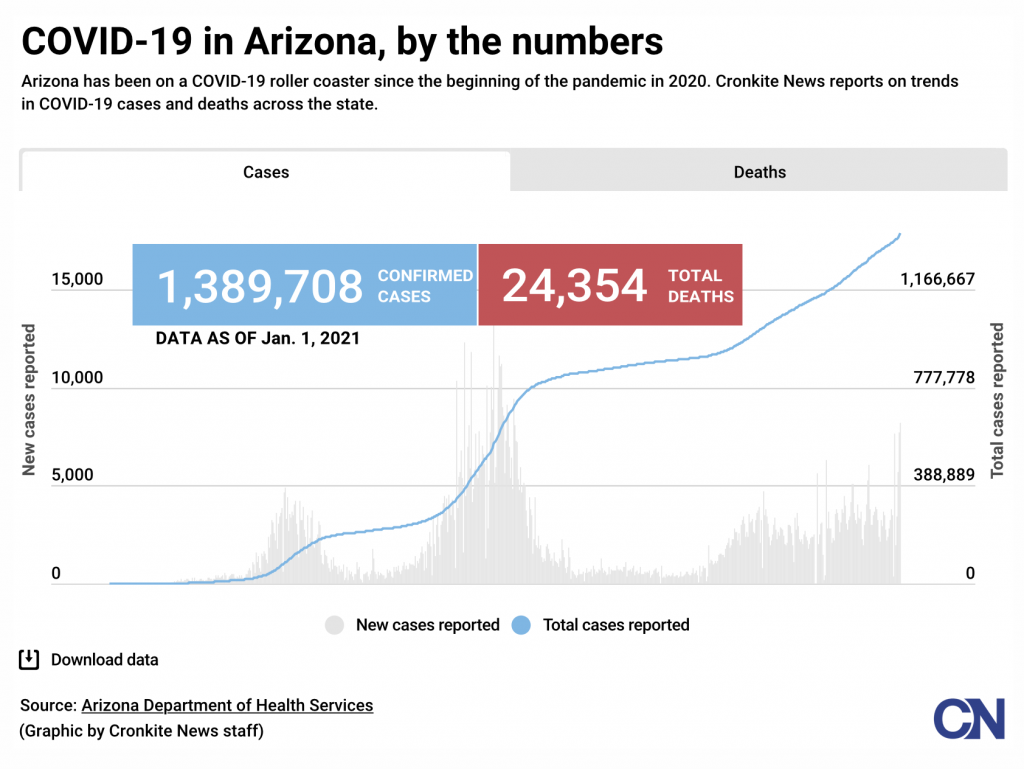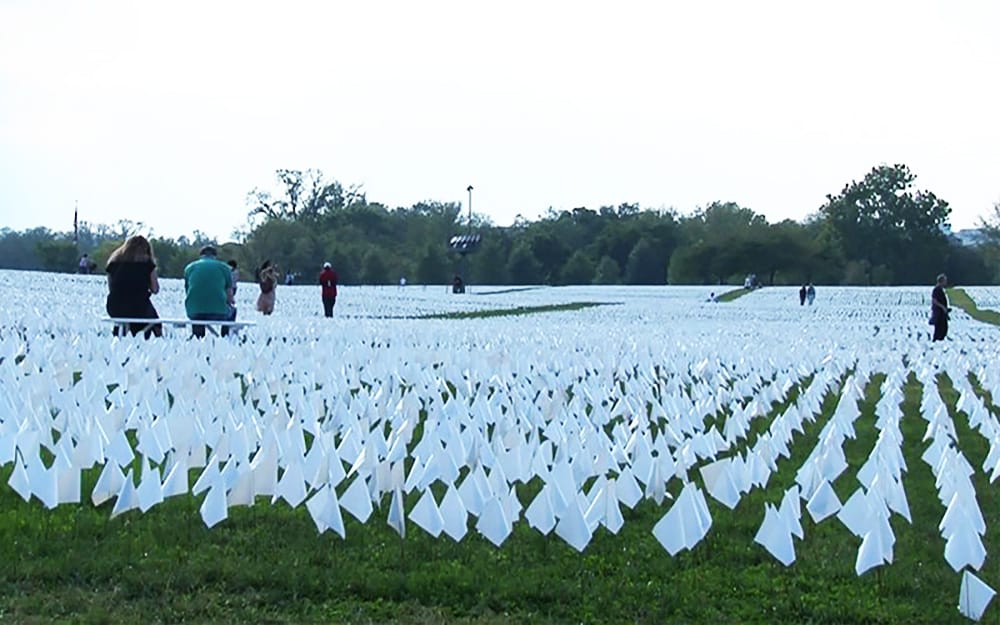Washington visitors ponder a field of almost 690,000 flags, one for every U.S. COVID-19 death since the pandemic began, in late September, when Arizona’s death toll was nearing 20,000. Since then, the U.S. death toll has climbed over 820,000 and the Arizona death toll hit 24,229, likely making COVID-19 the leading cause of death in the state in 2021. /File photo by Kimberly Silverio-Bautista/Cronkite News
By Diannie Chavez | Cronkite News
COVID-19 claimed almost 15,800 lives in Arizona this year, putting it on track to be the leading cause of death in the state in 2021.
Official mortality numbers will not be available for months, but the other top causes of death in the state, cancers and heart disease, have each killed around 12,000 people in recent years. The exception was 2020, when heart disease claimed 14,185 lives in the state.
The Arizona Department of Health Services reported an unofficial total of 24,229 COVID-19 deaths in the state as of Dec. 31. With 8,430 of those deaths coming in 2020, according to a preliminary state report on vital statistics for that year, that would leave 15,799 deaths from COVID-19 in 2021.
“That’s a lot of deaths and deaths are hard to be mistaken about,” said Dr. Joshua LaBaer, executive director of Arizona State University’s Biodesign Institute. “A death is a death, there’s no misdiagnosis there.”
The surging COVID-19 numbers are a change from 2020, when the virus was the third-leading cause of death behind heart disease and cancer.
Related: Arizona court upholds decision to not release COVID records for book
LaBaer said that while it does not surprise him that COVID-19 could be the leading cause of death in the state, he is surprised by the number of deaths that occurred after the roll-out of vaccines early this year. COVID-19 killed more than 42 people a day on average in 2021, up from a daily average of just under 26 a day in 2020.
“It’s always difficult to predict,” LaBaer said. “I thought that with all the people vaccinated and people taking boosters that we wouldn’t be seeing a wave like we are.”
But with continued vaccine hesitancy and the emergence of new variants, other health experts predict the virus will be around for at least a third calendar year and will continue to take the lives of many.
“Until we get enough people in our country vaccinated so that we break the cycle of circulation and infection, we’re going to continue to have it,” said Dr. Georges Benjamin, executive director of the American Public Health Association.

In Arizona, 69.6% of eligible people had received at least one dose of the COVID-19 vaccine as of Dec. 31, according to the AZDHS, compared to 78% of people nationwide who had received at least one dose, according to the Centers for Disease Control and Prevention.
The state does not provide data on the number of people who have received vaccine boosters, but the CDC said that nationwide 36.3% of those 18 and older had gotten boosters.
Benjamin said it is important for those who are not vaccinated, and are eligible to receive the vaccine, to get vaccinated as soon as possible in order to help prevent more deaths.
“It is really clear that if you are fully vaccinated, and even better if you are boosted, your risk of getting really sick and dying, even if you get infected from COVID, is extraordinarily low,” Benjamin said.
Benjamin criticized those elected officials who he said “have not supported getting vaccinated. And we have other people who have actually put functional political barriers in the way.”
Will Humble, the executive director of the Arizona Public Health Association, agreed that there will likely continue to be thousands of new cases a day in the coming year, but he thinks the mortality rate will eventually decline.
“Over time, the general trend will be towards this becoming a less lethal disease but it’s not something that will probably ever go away,” Humble said. “But COVID-19 will eventually no longer be a public health emergency when enough people have been vaccinated.”
Benjamin said that while he does not know what the death toll will look like in the upcoming new year, he does not expect the virus to go away anytime soon.
“Only time will tell, but in those communities that remain unvaccinated, we are going to see continued significant disease spread,” Benjamin said.
“Mask wearing is still going to be with us for a while,” Benjamin said. “Sorry.”





